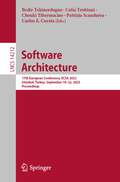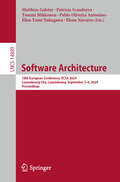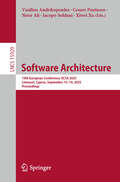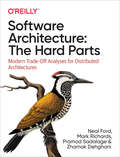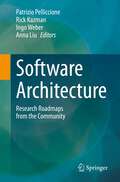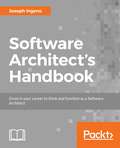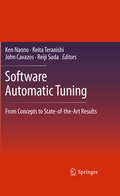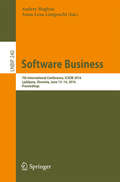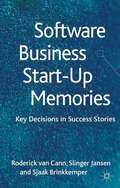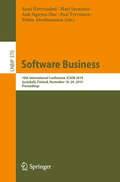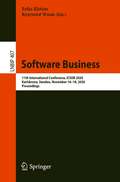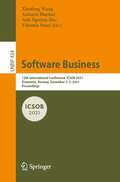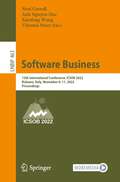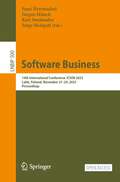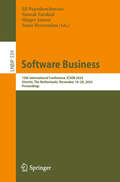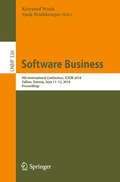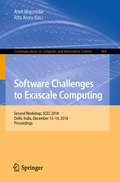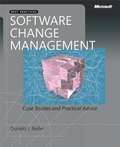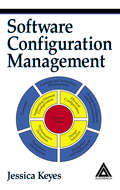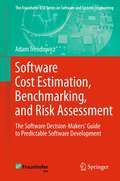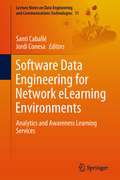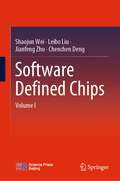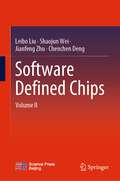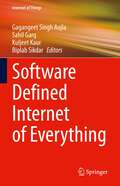- Table View
- List View
Software Architecture: 17th European Conference, ECSA 2023, Istanbul, Turkey, September 18–22, 2023, Proceedings (Lecture Notes in Computer Science #14212)
by Bedir Tekinerdogan Carlos E. Cuesta Patrizia Scandurra Catia Trubiani Chouki TibermacineThis book constitutes the refereed proceedings of the 17th International Conference on Software Architecture, ECSA 2023, held in Istanbul, Turkey, in September 2023.The 16 full papers and the 9 short papers included in this volume were carefully reviewed and selected from 71 submissions. They address the most recent, innovative, and significant findings and experiences in the field of software architecture research and practice.
Software Architecture: 18th European Conference, ECSA 2024, Luxembourg City, Luxembourg, September 3–6, 2024, Proceedings (Lecture Notes in Computer Science #14889)
by Tommi Mikkonen Elena Navarro Matthias Galster Patrizia Scandurra Elisa Yumi Nakagawa Pablo Oliveira AntoninoThis book constitutes the refereed proceedings of the 18th European Conference on Software Architecture, ECSA 2024, held in Luxembourg City, Luxembourg, during September 2–6, 2024. The 14 full research papers, 3 experience report papers, 7 short papers and 3 industry papers included in this book were carefully reviewed and selected from 89 submissions They were organized in topical sections as follows: Architecture modeling and design; Architecture evaluation; Microservices architecture; Sustainability; Trustworthiness; Architecture decision making; and Architecture documentation.
Software Architecture: 19th European Conference, ECSA 2025, Limassol, Cyprus, September 15–19, 2025, Proceedings (Lecture Notes in Computer Science #15929)
by Cesare Pautasso Xiwei Xu Nour Ali Vasilios Andrikopoulos Jacopo SoldaniThis book constitutes the refereed proceedings of the 19th European Conference on Software Architecture, ECSA 2025, held in Limassol, Cyprus, during September 15–19, 2025. The 18 full papers and 9 short papers presented in this volume were carefully reviewed and selected from 80 submissions. They are grouped into the following topics: Architectures for MLOps; Large Language Models in Software Architecture; Architectures for Embedded Systems; Self-Adaptive, Secure and Federated Learning Systems; Microservice Architecture; Software Architecture Practices, Perspectives and Evolution; Industry papers.
Software Architecture: Modern Trade-Off Analyses for Distributed Architectures
by Neal Ford Mark Richards Pramod Sadalage Zhamak DehghaniThere are no easy decisions in software architecture. Instead, there are many hard parts--difficult problems or issues with no best practices--that force you to choose among various compromises. With this book, you'll learn how to think critically about the trade-offs involved with distributed architectures.Architecture veterans and practicing consultants Neal Ford, Mark Richards, Pramod Sadalage, and Zhamak Dehghani discuss strategies for choosing an appropriate architecture. By interweaving a story about a fictional group of technology professionals--the Sysops Squad--they examine everything from how to determine service granularity, manage workflows and orchestration, manage and decouple contracts, and manage distributed transactions to how to optimize operational characteristics, such as scalability, elasticity, and performance.By focusing on commonly asked questions, this book provides techniques to help you discover and weigh the trade-offs as you confront the issues you face as an architect.Analyze trade-offs and effectively document your decisionsMake better decisions regarding service granularityUnderstand the complexities of breaking apart monolithic applicationsManage and decouple contracts between servicesHandle data in a highly distributed architectureLearn patterns to manage workflow and transactions when breaking apart applications
Software Architecture: Research Roadmaps from the Community
by Patrizio Pelliccione Anna Liu Ingo Weber Rick KazmanThis book provides a collection of cutting-edge research roadmaps that attempt to determine and perhaps even shape the future of software architecture research. It contains a distillation of the outputs from several ICSA 2022 working sessions and the subsequent work from the authors.Software architecture research involves the study of the design and analysis of software systems, focusing on the high-level structure and organization of software components, as well as the interactions and relationships between them. It also focuses on the non-technical aspects of software design: how teams are organized, and how they communicate and work together.The first three chapters of the book investigate software architecture for emerging classes of software systems with widespread interest, including quantum computing, artificial intelligence-centric systems, and systems within value-based ecosystems. Subsequent chapters investigate the role of architecture in relation to modern development processes; sharing of data as an enabler for furthering research in software architecture; and teaching software architecture.In summary, this book provides an overview of the latest research and directions in software architecture, covering a wide array of current and emerging topics. Specifically, this book is a valuable resource for researchers and students to aid them in identifying fruitful paths for future research.
Software Architect’s Handbook: Become a successful software architect by implementing effective architecture concepts
by Joseph IngenoA comprehensive guide to exploring software architecture concepts and implementing best practicesKey FeaturesEnhance your skills to grow your career as a software architectDesign efficient software architectures using patterns and best practicesLearn how software architecture relates to an organization as well as software development methodologyBook DescriptionThe Software Architect’s Handbook is a comprehensive guide to help developers, architects, and senior programmers advance their career in the software architecture domain. This book takes you through all the important concepts, right from design principles to different considerations at various stages of your career in software architecture. The book begins by covering the fundamentals, benefits, and purpose of software architecture. You will discover how software architecture relates to an organization, followed by identifying its significant quality attributes. Once you have covered the basics, you will explore design patterns, best practices, and paradigms for efficient software development.The book discusses which factors you need to consider for performance and security enhancements. You will learn to write documentation for your architectures and make appropriate decisions when considering DevOps. In addition to this, you will explore how to design legacy applications before understanding how to create software architectures that evolve as the market, business requirements, frameworks, tools, and best practices change over time.By the end of this book, you will not only have studied software architecture concepts but also built the soft skills necessary to grow in this field.What you will learnDesign software architectures using patterns and best practicesExplore the different considerations for designing software architectureDiscover what it takes to continuously improve as a software architectCreate loosely coupled systems that can support changeUnderstand DevOps and how it affects software architectureIntegrate, refactor, and re-architect legacy applicationsWho this book is forThe Software Architect’s Handbook is for you if you are a software architect, chief technical officer (CTO), or senior developer looking to gain a firm grasp of software architecture.
Software Automatic Tuning
by Keita Teranishi Reiji Suda John Cavazos Ken NaonoAutomatic Performance Tuning is a new software paradigm which enables software to be high performance in any computing environment. Its methodologies have been developed over the past decade, and it is now rapidly growing in terms of its scope and applicability, as well as in its scientific knowledge and technological methods. Software developers and researchers in the area of scientific and technical computing, high performance database systems, optimized compilers, high performance systems software, and low-power computing will find this book to be an invaluable reference to this powerful new paradigm.
Software Business
by Andrey Maglyas Anna-Lena LamprechtThis book contains the refereed proceedings of the 7th International Conference on Software Business, ICSOB 2016, held in Ljubljana, Slovenia, in June 2016. Software business refers to commercial activities in and around the software industry aimed at generating income from the delivery of software products and services. The theme of the event was "Software as a New Way of Providing Cutting-edge Solutions". The 10 full and 5 short papers for ICSOB were selected from 38 submissions. The papers span a wide range of issues related to contemporary software business, ranging from strategic aspects to operational challenges. The strong presence of software ecosystem papers confirms the importance of this topic and influence on software business. In addition, a short abstract of the key note by Peter Lick and Hans-Bernd Kittlaus is also included.
Software Business Start-up Memories
by Sjaak Brinkkemper Slinger Jansen Roderick Van CannDescribes the decisions that led to the success of 16 software companies. The decisions are illustrated in detail, providing entrepreneurs with insights into what it takes to make a decision that can change the future of a company.
Software Business: 10th International Conference, ICSOB 2019, Jyväskylä, Finland, November 18–20, 2019, Proceedings (Lecture Notes in Business Information Processing #370)
by Pasi Tyrväinen Pekka Abrahamsson Sami Hyrynsalmi Mari Suoranta Anh Nguyen-DucThis book constitutes the refereed proceedings of the 10th International Conference on Software Business, ICSOB 2019, held in Jyväskylä, Finland, in November 2019. On the occasion of its tenth anniversary the conference theme this year was “The First Decade and Beyond” and focused on the development during the past decade, addressing the future of software-intensive business as well as studies on new and emerging ideas. The 18 full papers and 10 short papers presented together with 3 invited talks, 6 emerging research papers and a tutorial were carefully reviewed and selected from 52 submissions. They are organized in the following topical sections: software ecosystems; management of software products; continual improvement and product development; impacts of digitalization; software business education; software startups and digital business.
Software Business: 11th International Conference, ICSOB 2020, Karlskrona, Sweden, November 16–18, 2020, Proceedings (Lecture Notes in Business Information Processing #407)
by Krzysztof Wnuk Eriks KlotinsThis book constitutes the refereed proceedings of the 11th International Conference on Software Business, ICSOB 2020, which was held during November 16-18, 2020. The conference was originally planned to take place in Karlskrona, Sweden, but changed to an online format due to the COVID-19 pandemic. The 13 full papers and 5 short papers presented were carefully reviewed and selected from 39 submissions. They deal with a range of topics including practices for engineering and marketing software-intensive products, extracting business value from machine learning based software components, ethical considerations of the software business, software ecosystems, and pedagogy of teaching entrepreneurship and software business.
Software Business: 12th International Conference, ICSOB 2021, Drammen, Norway, December 2–3, 2021, Proceedings (Lecture Notes in Business Information Processing #434)
by Xiaofeng Wang Anh Nguyen-Duc Viktoria Stray Antonio MartiniThis book constitutes the refereed proceedings of the 12th International Conference on Software Business, ICSOB 2021, which was held during December 2-3, 2021. The conference was originally planned to take place in Drammen, Norway, but changed to an online format due to the COVID-19 pandemic. The special theme of ICSOB 2021 was software sustainability. The 13 full papers and 5 short papers presented were carefully reviewed and selected from 39 submissions. They deal with a range of topics including software sustainability, Agile development, DevOps, software startups, prototyping, software ecosystems, crowdsourcing platforms, technical debts, and risk management.
Software Business: 13th International Conference, ICSOB 2022, Bolzano, Italy, November 8–11, 2022, Proceedings (Lecture Notes in Business Information Processing #463)
by Noel Carroll Xiaofeng Wang Anh Nguyen-Duc Viktoria StrayThis book constitutes the refereed proceedings of the 13th International Conference on Software Business, ICSOB 2022, which was held during November 8-11, 2022 in Bolzano, Italy. The special theme of ICSOB 2022 was “Software for Digital Transformation”. The 19 full papers together with 6 short papers presented were carefully reviewed and selected from 53 submissions. The conference is covering different aspects of Digital Transformation, Software Startups, Software Ecosystems, Software Processes, Platform Economy, Software Sustainability, and People and Process Analytics.
Software Business: 14th International Conference, ICSOB 2023, Lahti, Finland, November 27–29, 2023, Proceedings (Lecture Notes in Business Information Processing #500)
by Jürgen Münch Kari Smolander Sami Hyrynsalmi Jorge MelegatiThis open access book constitutes the refereed proceedings of the 23rd International Conference on Software Business, ICSOB 2023, which was held in Lahti, Finland, during November 27–29, 2023. The special theme of ICSOB 2023 was Digital Agility: Mastering Change in Software Business and Digital Services.The 27 full papers and 8 short papers presented in this book were carefully reviewed and selected from 79 submissions. They were organized in topical sections as follows: Requirements; software procurement; platforms, ecosystems and data; artificial intelligence; software startups; software product management; software and business co-development; and emerging digital world.
Software Business: 15th International Conference, ICSOB 2024, Utrecht, The Netherlands, November 18–20, 2024, Proceedings (Lecture Notes in Business Information Processing #539)
by Slinger Jansen Efi Papatheocharous Siamak Farshidi Sonja HyrynsalmiThis book constitutes the refereed proceedings of the 15th International Conference on Software Business, ICSOB 2024, which took place in Utrecht, The Netherlands, during November 18-20, 2024. The special theme of ICSOB 2024 was Ethics, Equity, and Sustainability in Software Business. The 23 full papers and 13 short papers presented in this book were carefully reviewed and selected from 98 submissions. The papers are organized in the following topical sections: Ethical Challenges in Software Development; Developer Experience and Ecosystem Trust; Transparency and Trust in AI; Diversity and Inclusion in Software Business; Sustainable ICT; Experimentation and Innovations; Tools in Software Ecosystems; and Software Startups and Digital Transformation.
Software Business: 9th International Conference, ICSOB 2018, Tallinn, Estonia, June 11–12, 2018, Proceedings (Lecture Notes in Business Information Processing #336)
by Sjaak Brinkkemper Krzysztof WnukThis book constitutes the refereed proceedings of the 9th International Conference on Software Business, ICSOB 2018, held in Tallinn, Estonia, in June 2018. This year the conference theme was “How Digitalization Impacts Software Business” and focused on digitalization and its impact on the speed of business models and business modeling and the realization of these business models. The 11 full papers and 1 short paper presented in this volume were carefully reviewed and selected from 34 submissions. They were organized in topical sections named: software ecosystems; software product management and business models; and software start-ups.
Software Challenges to Exascale Computing: Second Workshop, SCEC 2018, Delhi, India, December 13-14, 2018, Proceedings (Communications in Computer and Information Science #964)
by Ritu Arora Amit MajumdarThis book constitutes the refereed proceedings of the Second Workshop on Software Challenges to Exascale Computing, SCEC 2018, held in Delhi, India, in December 2018.The 10 papers presented in this volume were carefully reviewed and selected from 24 submissions and focus on scientific applications, performance analysis and optimization, science gateways and high-productivity tools and frameworks.
Software Change Management: Case Studies and Practical Advice
by Donald J. ReiferDrawing from 30+ years of field experience, with case studies spanning industry, government, and academia, this practical guide illuminates the change-management approaches that lead to successful software process improvement.
Software Configuration Management
by Jessica KeyesAn effective systems development and design process is far easier to explain than it is to implement. A framework is needed that organizes the life cycle activities that form the process. This framework is Configuration Management (CM). Software Configuration Management discusses the framework from a standards viewpoint, using the original
Software Cost Estimation, Benchmarking, and Risk Assessment
by Adam TrendowiczSoftware effort estimation is a key element of software project planning and management. Yet, in industrial practice, the important role of effort estimation is often underestimated and/or misunderstood. In this book, Adam Trendowicz presents the CoBRA method (an abbreviation for Cost Estimation, Benchmarking, and Risk Assessment) for estimating the effort required to successfully complete a software development project, which uniquely combines human judgment and measurement data in order to systematically create a custom-specific effort estimation model. CoBRA goes far beyond simply predicting the development effort; it supports project decision-makers in negotiating the project scope, managing project risks, benchmarking productivity, and directing improvement activities. To illustrate the method's practical use, the book reports several real-world cases where CoBRA was applied in various industrial contexts. These cases represent different estimation contexts in terms of software project environment, estimation objectives, and estimation constraints. This book is the result of a successful collaboration between the process management division of Fraunhofer IESE and many software companies in the field of software engineering technology transfer. It mainly addresses software practitioners who deal with planning and managing software development projects as part of their daily work, and is also of interest for students or courses specializing in software engineering or software project management.
Software Data Engineering for Network eLearning Environments: Analytics and Awareness Learning Services (Lecture Notes on Data Engineering and Communications Technologies #11)
by Jordi Conesa Santi CaballéThis book presents original research on analytics and context awareness with regard to providing sophisticated learning services for all stakeholders in the eLearning context. It offers essential information on the definition, modeling, development and deployment of services for these stakeholders. Data analysis has long-since been a cornerstone of eLearning, supplying learners, teachers, researchers, managers and policymakers with valuable information on learning activities and design. With the rapid development of Internet technologies and sophisticated online learning environments, increasing volumes and varieties of data are being generated, and data analysis has moved on to more complex analysis techniques, such as educational data mining and learning analytics. Now powered by cloud technologies, online learning environments are capable of gathering and storing massive amounts of data in various formats, of tracking user-system and user-user interactions, and of delivering rich contextual information.
Software De Enrutamiento Kindle, Aplicación, Herramienta, Guía De Consejos Para Kindle Fire
by Larry Alison David CallejoUna guía paso a paso sobre cómo rootear dispositivos Kindle Si no, la mejor característica de los dispositivos Kindle es la capacidad de rootearlos. Esto le permitirá acceder a cualquier contenido que desee, como programas de televisión, aplicaciones, música y películas. Aquí tienes lo que obtendrás: -Obras para cualquier dispositivo Kindle -Acerca del enraizamiento -Cómo rootear tu Kindle Problemas de solución de problemas -Cómo agregar Google Play -Disfrutar de acceso a aplicaciones, películas, música y programas de televisión -> Desplácese hasta la parte superior de la página y haga clic en agregar al carro para comprar al instante <- Renuncia: Este autor y / o propietario (s) de derechos no hacen afirmaciones, promesas o garantías sobre la exactitud, integridad o adecuación de los contenidos de este libro, y expresamente renuncia a la responsabilidad por errores u omisiones en los contenidos. Este producto es solo para uso de referencia.
Software Defined Chips: Volume I
by Leibo Liu Shaojun Wei Jianfeng Zhu Chenchen DengThis is the first book of a two-volume book set which introduces software defined chips. In this book, it introduces the conceptual evolution of software defined chips from the development of integrated circuits and computing architectures. Technical principles, characteristics and key issues of software defined chips are systematically analyzed. The hardware architecture design methods are described involving architecture design primitives, hardware design spaces and agile design methods. From the perspective of the compilation system, the complete process from high-level language to configuration contexts is introduced in detail. This book is suitable for scientists and researchers in the areas of electrical and electronic engineering and computer science. Postgraduate students, practitioners and professionals in related areas are also potentially interested in the topic of this book.
Software Defined Chips: Volume II
by Leibo Liu Shaojun Wei Jianfeng Zhu Chenchen DengThis book is the second volume of a two-volume book set which introduces software-defined chips. In this book, the programming model of the software-defined chips is analyzed by tracing the coevolution of modern general-purpose processors and programming models. The enhancement in hardware security and reliability of the software-defined chips are described from the perspective of dynamic and partial reconfiguration. The challenges and prospective trends of software-defined chips are also discussed. Current applications in the fields of artificial intelligence, cryptography, 5G communications, etc., are presented in detail. Potential applications in the future, including post-quantum cryptography, evolutionary computing, etc., are also discussed. This book is suitable for scientists and researchers in the areas of electrical and electronic engineering and computer science. Postgraduate students, practitioners and professionals in related areas are also potentially interested in the topic of this book.
Software Defined Internet of Everything (Internet of Things)
by Gagangeet Singh Aujla Sahil Garg Kuljeet Kaur Biplab SikdarThis book provides comprehensive discussion on key topics related to the usage and deployment of software defined networks (SDN) in Internet of Everything applications like, healthcare systems, data centers, edge/fog computing, vehicular networks, intelligent transportation systems, smart grids, smart cities and more. The authors provide diverse solutions to overcome challenges of conventional network binding in various Internet of Everything applications where there is need of an adaptive, agile, and flexible network backbone. The book showcases different deployment models, algorithms and implementations related to the usage of SDN in Internet of Everything applications along with the pros and cons of the same. Even more, this book provides deep insights into the architecture of software defined networking specifically about the layered architecture and different network planes, logical interfaces, and programmable operations. The need of network virtualization and the deployment models for network function virtualization is also included with an aim towards the design of interoperable network architectures by researchers in future. Uniquely, the authors find hands on practical implementation, deployment scenarios and use cases for various software defined networking architectures in Internet of Everything applications like healthcare networks, Internet of Things, intelligent transportation systems, smart grid, underwater acoustic networks and many more. In the end, design and research challenges, open issues, and future research directions are provided in this book for a wide range of readers
